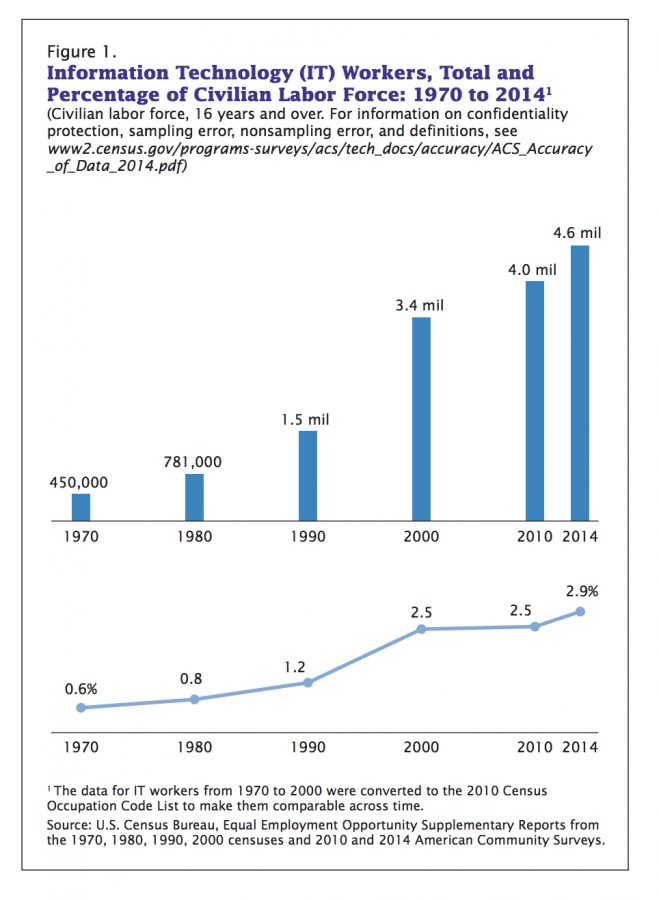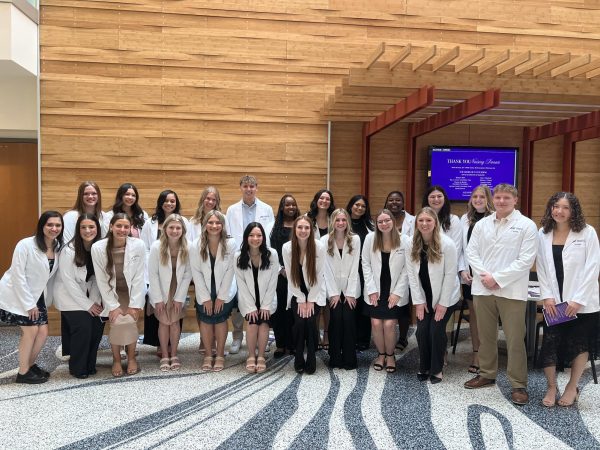UNI blazes trail for women in MIS
According to this 2014 Census report, IT workers make up an increasingly large portion of the United States’ now service-dominated economy.
Apr 2, 2018
UNI is unique in a variety of ways, but one that some students may not know about is the diverse group of Management Information Systems (MIS) majors on campus. Around half of the MIS majors at UNI are female. This is in strong contrast to the majority of the field, in both study and employment, which is heavily dominated by men on the national level.
According to the Census website, in a report regarding Occupations in Information Technology written by Julia Beckhusen in 2016, in most information systems careers men make up around 60 percent or more of the workforce. This puts UNI in a unique position to help female students gain an upper hand in an increasingly necessary field, whether the focus is on business and management or a heavier focus on the technical side of information systems.
MIS is one of Forbes’ “15 Most Valuable College Majors,” clocking in at number eight on the list. Not only is it on Forbes’ most valuable college majors list, according to a Forbes article by Niall McCarthy published in 2016, but Management Information Systems is one of the highest paid business majors out of college, with an average starting salary of $58,526.
One of the professors of MIS at UNI is Arti Mann.
“Management Information Systems are really good at fulfilling that gap [in business], because people need business knowledge and technical knowledge,” Mann said. “There is a big gap of people who can understand both sides.
“In the Management Information Systems, you learn the programing, and you are starting something which is business analytics, and you get a very good understanding of the technical side of it. With your other business courses, you get the business part of it. So, people who can do this — bridge the gap — open the potential [for future careers].”
Mann also explained that information systems is becoming necessary in the field of business and because of the necessity, it is becoming a core for every single discipline in business.
“If you take accounting, if you take finance, if you take any side of business, information systems are either playing a supporting role, or they are kind of replacing human activity,” Mann said. “So, any knowledge related to information systems — even if you are not core management information systems — is really helpful.”
For Mann, having female professors in the MIS program can help encourage female students to join the MIS program.
It can give them a sense of “maybe I can do that,” according to Mann.
In introductory courses, Mann and other professors attempt to engage students on the possibility of going into the MIS program.
“A lot of students who want to do accounting end up taking MIS as a minor; those who want to do supply chain end up doing MIS as a minor,” Mann said. “There are a lot of benefits to be had, because if you understand information systems you will always be better than people who have had no training, because you can’t survive without information systems.”
One student currently involved in the MIS program is Julie Hendrickson, who is a senior double majoring in MIS and supply chain management.
“I enjoy analyzing and reporting data through either program I create or using a multitude of other platforms available,” Hendrickson said.
“With UNI having a strong women’s presence it is definitely an asset to the MIS program,” Hendrickson said. “The IT skills we learn on campus like computer programming, analytical and management skills are not gender specific like stereotypes presume. It is important for people to see women breaking this stereotype. Administration and faculty support have been and will continue to be integral to the success of this program.”
Another student, Danielle Lorenz, is currently a senior accounting and MIS major.
The MIS program allowed Lorenz to have “more opportunity for innovation and working hands-on with systems.”
Additionally, Lorenz’s future career as a business analyst will allow for a hybrid role between accounting and IT.
During her time at UNI she sees the changing number of woman in the MIS program as a good thing.
“It’s very encouraging when you’re pursuing a field that was originally dominated by males,” Lorenz said. “There is a great deal of support and opportunity for women in the MIS program, and I think this is very crucial if we want to keep building and improving upon our MIS program.”








